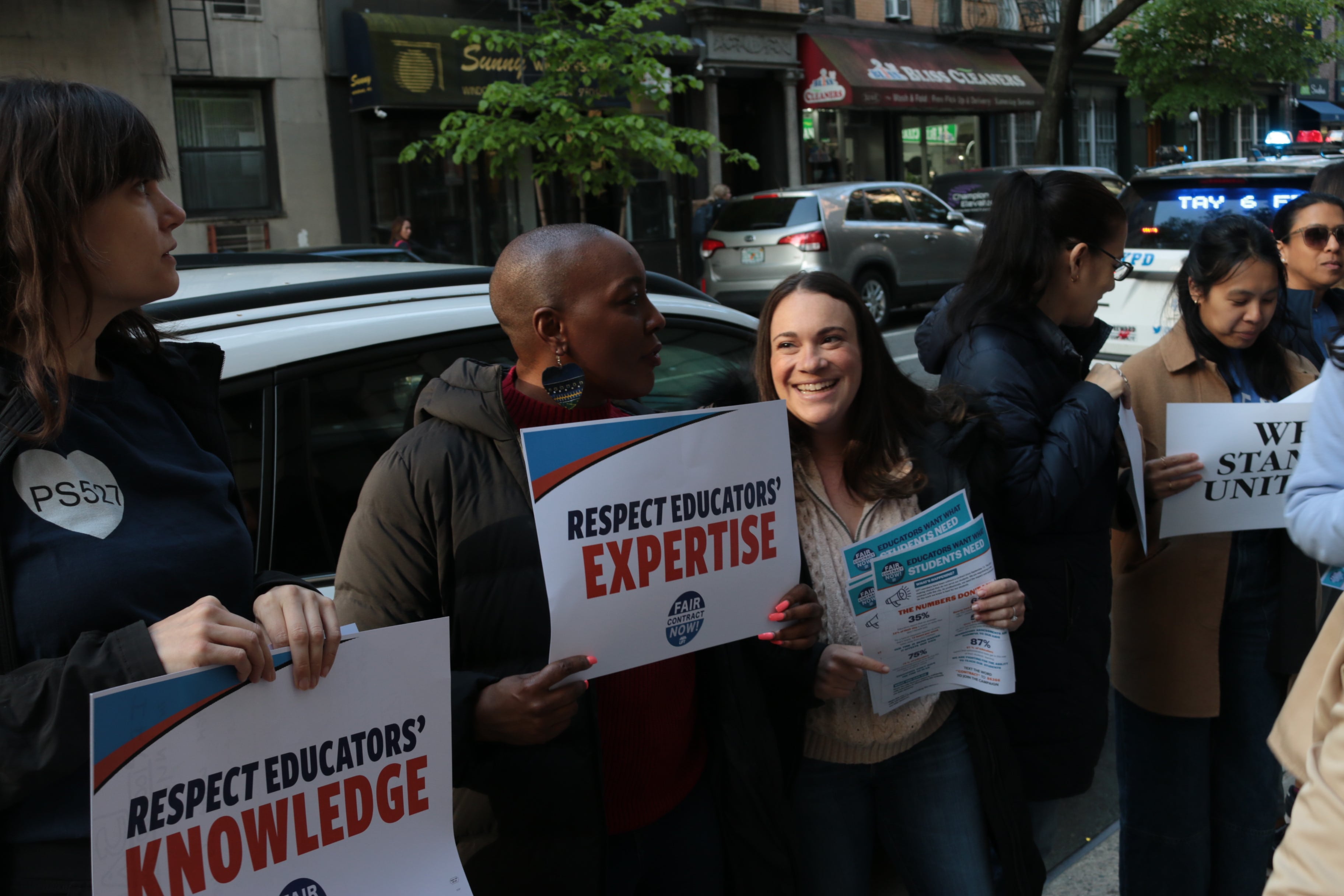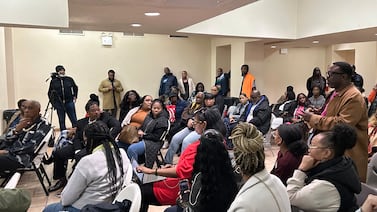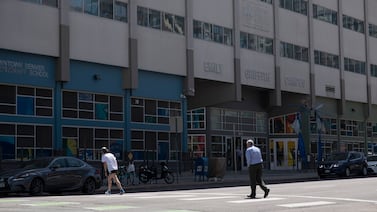Sign up for Chalkbeat New York’s free daily newsletter to keep up with NYC’s public schools.
New York City reached a deal with the teachers union for a five-year contract that includes annual raises, expands opportunities for virtual learning, and allows some remote work for certain employees, Mayor Eric Adams announced Tuesday.
The tentative deal for the United Federation of Teachers’ 115,000 full-time and 5,000 part-time education department employees includes 3% wage increases for the first three years, followed by a 3.25% increase in the fourth year, and 3.5% in the fifth year. The full contract would cost the city $6.4 billion, city officials said.
Starting salary for new teachers will jump from $61,070 to $72,349 by the end of the contract. In five years, the most experienced teachers will earn $151,271. The deal also proposes to cut in half the amount of time it takes teachers to reach a $100,000 salary — from 15 to eight years.
It also includes annual retention bonuses that will grow to $1,000 in 2026, for as long as an employee is an education department employee, and will be built into the system going forward. It’s the first time the union has negotiated such a payment, said Michael Mulgrew, president of the teachers union, during a press conference announcing the deal.
“We’re saying to all of our titles and every member, whether you’re in the first year or your 25th year, New York City is saying that we appreciate you, we recognize the challenges that you take on every day and you will receive $1,000 every [year] for that,” Mulgrew said. [Mulgrew initially misspoke, and his statement has been clarified.]
The retention bonus is “a good strategy” for keeping teachers, said Melissa Arnold Lyon, assistant professor of politics and policy at the University of Albany, who has been following the UFT’s contract negotiations. Teacher turnover rates in New York City and elsewhere hit an unusual high after last school year, potentially exacerbated by the stresses of the pandemic.
“There are a lot of costs of trying to find and hire new teachers,” Lyon said. “If $1,000 helps you to keep a teacher, at least on the micro level, that’s worth it.”
The agreement is retroactive to Sept. 14, 2022, and runs through Nov. 28, 2027, city officials said. The wage increases follow the pattern of raises set by the February agreement with District Council 37, which includes cafeteria workers, parent coordinators, and crossing guards.
Many teachers expected that their union would follow suit and had expressed concerns given that the previous deals were not keeping pace with inflation, which has moderated somewhat in recent months but reached 6.5% last year. Teachers had complained that their responsibilities have only increased since the pandemic, as they continue to catch up students academically and socially from years of interrupted learning.
A virtual learning program to expand
The contract would expand a pilot remote learning project that allowed small schools to offer virtual courses — such as AP Chemistry — that they otherwise couldn’t because of staffing issues. This year, the program used federal funding to grow, reaching about 1,500 students across 58 schools, with 23 separate online courses outside traditional school hours.
Under the tentative deal, high schools, as well as schools that serve grades 6-12, could offer virtual courses after school and on the weekends starting in the next academic year, union officials said, though nothing would bar schools from creating tutoring programs, too. Those programs would be available to students who volunteer to participate, and would be staffed by volunteer teachers. A quarter of high schools would be allowed to participate next year, growing to all high schools by the 2027-28 school year. High schools must apply to participate, education officials said.
Courses might be offered at individual schools or through the central education department, and high schools must apply to participate, education officials said. Part-time remote teachers can apply to be part of their school-based remote program and work before or after the school day; there will also be full-time, centrally hired teachers for the other program.
Programs could vary, Gendar said. For example, a school could offer evening courses, from 4 p.m. to 9 p.m., for students who are missing classes because they’re working day jobs, she said.
Schools could offer non-traditional schedules for students and teachers who want them. If a teacher volunteers to work a virtual program in addition to their regular work day, they will be paid overtime, Gendar said.
During a press conference, schools Chancellor David Banks said the virtual learning agreement gives students more flexibility, noting that some benefited from remote learning during the pandemic.
“Students who were at risk of dropping out were able to continue their coursework on a schedule that works best for them,” Banks said of remote learning during the start of the pandemic. “This expands those types of opportunities across the entire system.”
The contract would also allow some employees, who don’t work directly in schools, to work remotely for up to two days a week. It was not immediately clear which employees that would include.
Another sticking point was over how teachers would get to spend an extra 155 minutes each week after school. The deal would allow them, as they did this year, to do professional development and parent outreach, and it added a new option for teachers to do other classroom work of their choice in that time.
Teachers have mixed feelings
The contract is not yet final. First, the union’s negotiating committee, composed of 500 members, along with its executive board and delegate assembly will decide whether to send the tentative deal to all union members for a vote. Union officials did not immediately provide dates for those votes.
Some teachers took to social media to criticize the deal, but pushing back against it could be an uphill battle. The union cannot easily pull off a work stoppage because a teachers strike would violate New York’s Taylor Law, which imposes significant financial penalties for public sector unions that strike.
Robert Effinger, a union chapter leader at the Bronx High School of Business, said the pay increases surpassed his expectations.
Although some educators hoped that the salary increases would exceed inflation, the union was hemmed in by the pattern set by unions that negotiated contracts earlier this year. But Effinger said he was glad to see the union negotiate a quicker path to higher pay, an issue he hopes will help retain more educators.
“One of the reasons people burn out in education is they feel like they’re doing a lot of labor that is not appropriately compensated,” he said. “Having an accelerated early track is better for keeping people in.”
Still, he said he’s eager to hear more details about other elements of the contract including increased teacher autonomy, a major part of the union’s campaign, which focused on burdensome paperwork requirements educators face.
The union plans to hold a virtual town hall for members on Thursday at 4 p.m.
Alex Zimmerman contributed.
Reema Amin is a reporter covering New York City public schools. Contact Reema at ramin@chalkbeat.org.
Amy Zimmer is the bureau chief for Chalkbeat New York. Contact Amy at azimmer@chalkbeat.org.






